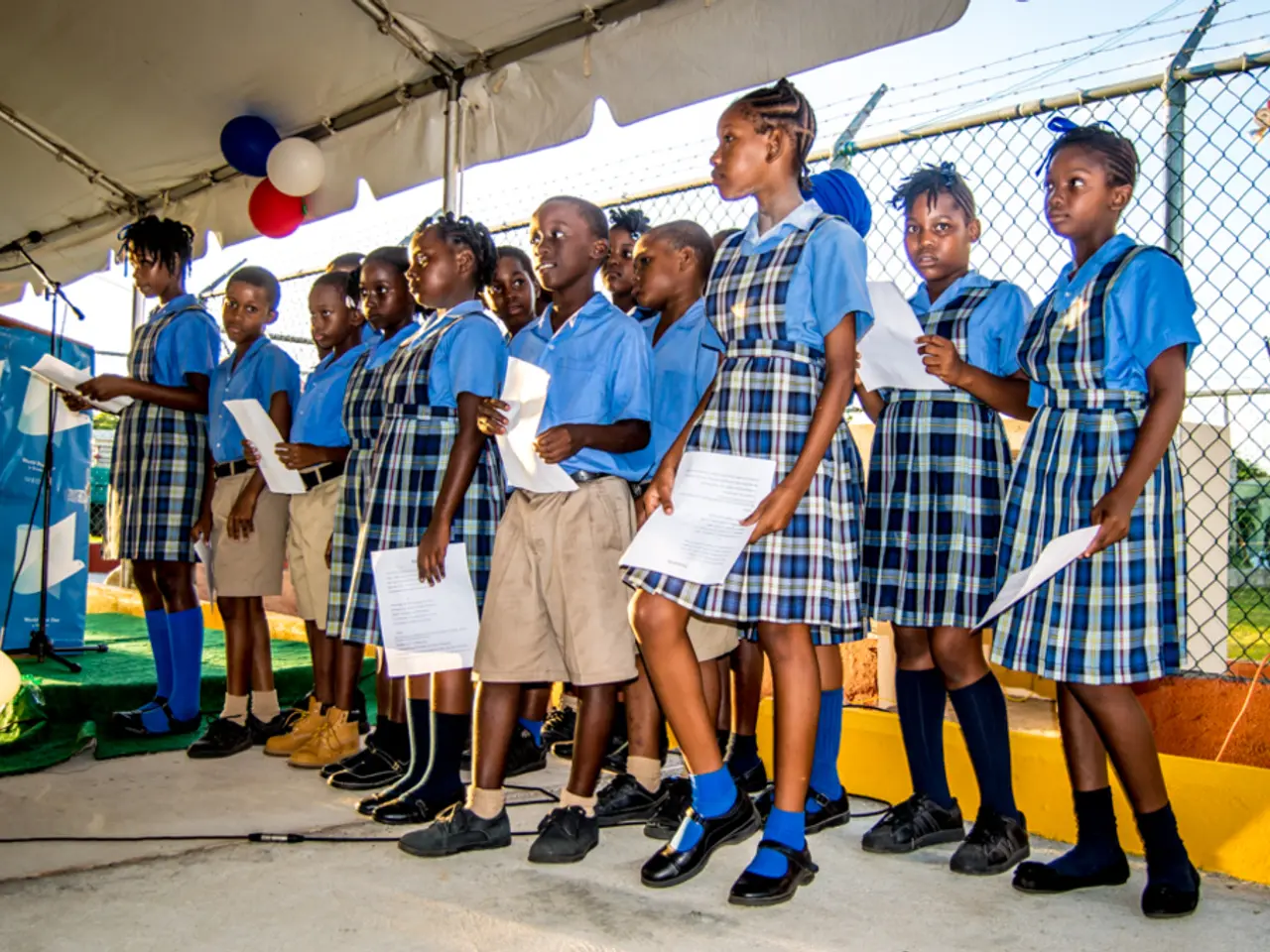Strained feelings at school: Triggers, indications, and coping strategies
School anxiety, also known as school phobia, is a condition that affects many children, causing excessive fear and worry about attending school. This condition can have significant effects on a child's social, emotional, and educational development, making it crucial to address it early on.
Psychotherapies such as Cognitive Behavioral Therapy (CBT) and medications like selective serotonin reuptake inhibitors (SSRIs) are effective treatment strategies for school anxiety in children.
CBT is the most researched and scientifically supported therapy for treating anxiety in children and teenagers. It focuses on teaching practical coping skills, challenging negative thoughts, and managing anxiety symptoms through behavioral techniques and developing insight. Other helpful psychotherapies include Solution Focused Brief Therapy (SFBT), which is goal-oriented and emphasizes realistic, actionable changes, and family therapy, which supports parents and caregivers in creating a less stressful environment and in actively supporting the child’s treatment.
In addition to psychotherapy, medications such as SSRIs (e.g., Prozac, Zoloft) may be prescribed, especially in cases of severe or persistent anxiety. Starting these medications at low doses and increasing gradually helps minimize side effects. Medication is often most effective when combined with behavioral therapies.
Practical daily strategies to complement treatment include listening to the child's specific worries and helping them problem-solve, teaching coping skills such as relaxation exercises, deep breathing, and encouraging healthy routines, and normalizing anxiety as a common and manageable reaction.
Mental health professionals do not fully understand the causes of school anxiety, but for some children, it can be related to specific causes like bullying or bad experiences at school, while for others, it may be more general and related to social or performance anxiety. Children may develop anxiety if they have been home for a long period, such as during summer vacation or because of illness, or after a stressful event like the death of a family member or moving to a new home.
Parents and caregivers can provide support by talking with the child about their anxiety, helping them develop healthy coping mechanisms, modeling positive behavior, teaching relaxation techniques, and staying involved in their education. Avoiding reacting to the child's anxiety in a way that reinforces it (e.g., arguments, bribes, threats) is important.
Exposure-response therapy (ERP) focuses on helping children face their fears in a gradual and controlled way. Treatment and management of school anxiety may require a team approach and can include cognitive-behavioral therapy, exposure therapy, and medication. A collaborative team approach involving the child, their parents or caregivers, school personnel, and mental health professionals is often necessary.
Untreated anxiety can lead to other problems, such as depression, substance use disorders, and social isolation. It is crucial to seek professional help if a child is missing school frequently or refusing to go to school, as school refusal can hurt the child’s education and social development. Dialectical behavioral therapy (DBT) may help with anxiety and school refusal by emphasizing mindfulness and acceptance, as well as change. Benzodiazepines may be prescribed for children with severe school anxiety, but they carry the risk of side effects and should only be used for short-term treatment.
In conclusion, addressing school anxiety in children requires a combination of psychotherapies, medications, family involvement, and coping skill development. By working together, parents, caregivers, school personnel, and mental health professionals can help children manage their anxiety and thrive in school.
- Cognitive Behavioral Therapy (CBT) is the most researched and scientifically supported therapy for treating anxiety in children and teenagers, focusing on teaching practical coping skills, challenging negative thoughts, and managing anxiety symptoms.
- In addition to psychotherapy, medications such as selective serotonin reuptake inhibitors (SSRIs) may be prescribed for severe or persistent school anxiety, with starting these medications at low doses and increasing gradually to minimize side effects.
- Solution Focused Brief Therapy (SFBT) and family therapy are other helpful psychotherapies that can support children with school anxiety, with SFBT being goal-oriented and family therapy emphasizing a less stressful environment and active support.
- Exposure-response therapy (ERP) is a treatment strategy that helps children face their fears in a gradual and controlled way, while dialectical behavioral therapy (DBT) may help with anxiety and school refusal by emphasizing mindfulness and acceptance.
- Parents and caregivers play a crucial role in supporting children with school anxiety by talking about their anxiety, developing healthy coping mechanisms, modeling positive behavior, teaching relaxation techniques, and staying involved in their education.
- Untreated school anxiety can lead to other problems such as depression, substance use disorders, and social isolation, making it important to seek professional help if a child is frequently missing school or refusing to go.
- A collaborative team approach involving the child, their parents or caregivers, school personnel, and mental health professionals is often necessary for the treatment and management of school anxiety in the context of overall child and adolescent mental health, health-and-wellness, and mental health science.




